-
 Art of Wellness Acupuncture & Traditional Chinese Medicine (TCM)11704 Wilshire Blvd, Suite 295, Los Angeles, CA, 90025
Art of Wellness Acupuncture & Traditional Chinese Medicine (TCM)11704 Wilshire Blvd, Suite 295, Los Angeles, CA, 90025
myartofwellness@gmail.com310-451-5522 Office Hours
MonClosedTue7:30 am --4 pmWed7:30 am --4 pmThu7:30 am -- 4 pmFri7:30 am -- 4 pmSat7:30 am -- 4 pmSunClosedOur office opens from Tuesdays to Saturdays 7:30 am to 4 pm, will be closed on Memorial day, Independent day, Labor day, Thanksgiving day, Christmas and New year.
-
Recent Posts
- Chinese New Year 2026: Year of the Horse
- Acupuncture and TCM Treatment for Perimenopause Symptoms
- How to Treat Insulin Resistance With Acupuncture and TCM
- How to Treat Metabolic Syndrome With Acupuncture and TCM
- How to Treat Syncope With Acupuncture and TCM
- How to Treat Thoracic Outlet Syndrome With Acupuncture and TCM
- How to Treat Dupuytren’s Contracture With Acupuncture and TCM
- How to Treat Nutcracker Syndrome With Acupuncture and TCM
- How to Treat Rosacea With Acupuncture and TCM
- How to Treat Perioral Dermatitis With Acupuncture and TCM
- Lymphatic Drainage With Acupuncture and TCM
- How to Treat Turf Toe With Acupuncture
- How to Treat Nerve Pain With Acupuncture and TCM
- How to Treat Watery Eyes With Acupuncture and TCM
- How to Treat Ovarian Cysts With Acupuncture and TCM
- How to Treat Dystonia With Acupuncture and TCM
- Sign up to receive news and updates and get my free report:“The Top 10 Reasons to Try Acupuncture”

December 2025 M T W T F S S 1 2 3 4 5 6 7 8 9 10 11 12 13 14 15 16 17 18 19 20 21 22 23 24 25 26 27 28 29 30 31
Uncategorized
How to Treat Hay Fever With Acupuncture and TCM
By Qineng Tan, L.Ac. Ph.D. & Xiaomei Cai, L.Ac., Ph.D.

Itchy eyes, runny nose and sneezing? These are some of the classic seasonal allergy symptoms, also known as allergic rhinitis, or hay fever. Acupuncture and TCM herbs can help relieve allergies, including pollen allergy symptoms.
Seasonal allergies affect about 20% of Americans. Allergic rhinitis is an immune system reaction to an allergen in the air that can be inhaled, like pollen from budding trees, growing grass, and plants like ragweed. Hay fever is a common term that typically describes being allergic to pollen.
“Pollen” are tiny seeds from plants that can be carried by the wind. When there is lots of pollen in the air, this is called a high pollen count. You can check the pollen count, like a weather report, to see when it is particularly high, and thus may affect people who suffer from seasonal allergies and asthma.
While having an allergic reaction to common airborne allergens happens most often during the spring, summer, and early fall, when plants are giving off a lot of pollen, people can actually experience hay fever at any time of the year.
Similar allergy symptoms can occur due to exposure to dust mites, molds, and pet dander.
Acupuncture and TCM can help relieve the irritating symptoms caused by allergic reactions by helping to strengthen and balance the immune system so that it is not so easily triggered.
Top 10 Seasonal Allergy Symptoms
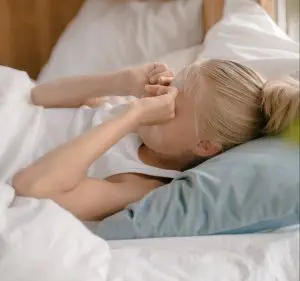
The body’s histamine response causes inflammation of the mucus membranes in the sinuses and throat. The increased mucus production occurs in order to drive out the offending allergens.
Pollen allergy symptoms are similar to those of the common cold. Signs of hay fever include:
- Sneezing
- Nasal congestion
- Runny nose, itchy nose
- Itchy eyes, watery eyes (allergic conjunctivitis)
- Itchy throat
- Postnasal drip
- Headaches, sinus pain
- Dark circles under eyes, puffy eyes, “allergic shiners”
- Fatigue, malaise, generally feeling under the weather
- Wheezing, coughing, trouble breathing
Skin rash is a less common symptom of seasonal allergies, but some people do develop a hay fever rash. The itchy allergy rash may look similar to hives: raised red welts on the skin.
Treatment for Hay Fever
The common medical treatment for hay fever is an antihistamine. Histamines are chemicals that occur naturally in the body as part of the immune response to allergens in the environment. The release of histamines is what leads to allergy symptoms like a runny nose and itchy eyes.
Antihistamines come in pill or spray form, and they block the histamine response, which can temporarily relieve the hay fever symptoms. However, these medications do have side effects, the most common of which is drowsiness.
If someone is not getting relief from antihistamines, then corticosteroids, or steroids, may be prescribed. These work as anti-inflammatories, which in this case means that they reduce the swelling of mucous membranes. Steroids, too, can have significant side effects, especially when used over a long period of time.
Nasal sprays for allergies, like Flonase or Mucinex, are decongestants that are designed to be sprayed into the nose to help reduce allergy runny nose. Again, these may provide some temporary relief, but people can quickly get used to them, so they stop being effective.
Acupuncture and TCM offer an alternative treatment for allergies that can help relieve hay fever symptoms without side effects.
Can Acupuncture Help Hay Fever?
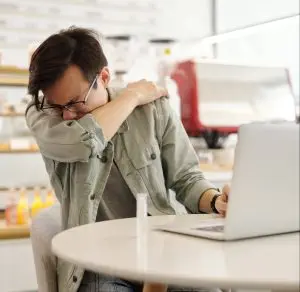
According to TCM theory, allergies fall under the category of illnesses that are caused by “wind” as a pathogenic force that can invade the body. In the TCM view, hay fever occurs due to wind-heat getting into the lungs.
Weakness of the kidneys and spleen can also contribute to hay fever; when they are sluggish, mucus tends to build up, and we become more easily fatigued.
When the defensive Qi is strong, it can protect us from cold, heat, wind, and dampness getting into the body and causing problems. Defensive Qi is roughly analogous to what we think of as the immune system in conventional medicine.
TCM treatment for allergic rhinitis may include acupuncture, herbal supplements, moxibustion, and nutrition counseling. TCM can be used either as an alternative therapy for allergies, or as an adjunct treatment for hay fever, along with pharmacological treatment.
Chinese herbs have been used for many centuries to treat allergy symptoms. Now, we are able to see scientific evidence that these herbs, such as astragalus, magnolia flower, and licorice root, do actually have an effect on the immune response and histamine function by helping to regulate the production of chemicals like cytotoxic T-cells and immunoglobulin G. Compounds found in scutellaria root have been found to inhibit the production of inflammatory cytokines, and stephania root can help prevent anaphylaxis.
With Chinese herbal medicine, we are able to create customized formulas for each patient, depending on their particular presentation of symptoms.
Acupuncture is a highly effective modality for all types of allergies, from allergic rhinitis to atopic dermatitis or eczema, and can help relieve the nasal sinus symptoms that affect the eyes, nose and mouth if someone is allergic to pollen. It can also help reduce itching due to allergic skin rashes.
A clinical trial conducted at a hospital in China showed that a regimen of acupuncture and herbs resulted in over 90% of patients reporting that their nasal symptoms were greatly reduced.
Another published study showed that acupuncture reduced levels of Immunoglobulin-E, an antibody that is associated with allergy responses.
A review of studies of acupuncture for allergic rhinitis showed that this treatment has both short-term and long-term efficacy.
TCM treatment for seasonal allergies allows us to get to the root cause of allergy symptoms and help prevent them from happening. In this way, acupuncture and herbs can function as preventive medicine for hay fever. Getting acupuncture periodically throughout the year can help you avoid allergy attacks when the pollen count is high.
Top 3 Tips for Hay Fever Prevention
Here are some things you can do to help prevent spring hay fever and relieve pollen allergy symptoms:
- Avoid dairy food and cold foods, which promote more mucus production.
- Apply warm compresses to the face to soothe the eyes and nasal area.
- Use an air purifier in your home to keep allergens out of the environment.
To relieve allergies, emphasize more cooked foods that help warm the body.
Acupuncture Near Me for Hay Fever in Los Angeles Area, Santa Monica
The multifaceted approach of TCM makes it uniquely suited to help relieve seasonal allergy symptoms. Acupuncture can help reduce hay fever symptoms right away and help prevent allergies from knocking you down every time the pollen count is high. Please do not hesitate to seek relief from hay fever by giving acupuncture and herbs a try.
*This article is for education from the perspective of Traditional Chinese Medicine only. The education provided by this article is not approved by FDA to diagnose, prevent, treat and cure human diseases. It should not stop you from consulting with your physician for your medical conditions. Traditional Chinese Medicine is based on Qi, which is an invisible force that usually cannot be observed by modern science. Because science focuses on testing ideas about the natural world with evidence obtained through observation, these aspects of acupuncture can’t be studied by science. Therefore acupuncture and Chinese herbs are often not supported by double-blind, randomized trials, and they are considered alternative medicine therapies in the United States.
How to Treat Ovulation Pain With Acupuncture and TCM
By Xiaomei Cai, L.Ac., Ph.D. and Qineng Tan, L.Ac., Ph.D.
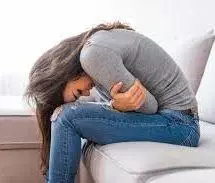
Cramping during ovulation, ovary pain, ovulation pain on one side? Ovulation cramps are very common. Acupuncture and TCM can help ease severe ovulation pain and help with all kinds of ovulation disorders.
The medical term for ovulation pain is “Mittelschmerz,” which means “middle pain” in German. The term Mittelschmerz syndrome refers to the fact that ovulation cramps occur in the middle of the menstrual cycle, typically about 14 days before the next menstrual period.
Studies have suggested that 35-50% of people who ovulate experience cramping during ovulation. Other ovulation symptoms include:
- Ovulation pain on one side
- Pelvic pain, abdominal pain
- Dull ache or sharp twinge of pain in pelvis
- Vaginal pain during ovulation, vaginal cramps
- Cervical cramps, cervix cramps, cervical pain
- Pain around or near the tailbone, tailbone pain
- Back pain, hip pain, or rib pain
- Bloating, bloated stomach
- Fatigue
- Breast tenderness
- Mood swings
- Spotting
- Nausea
- Diarrhea
- Lack of appetite
The process of ovulation involves luteinizing hormone (LH) stimulating follicles on the ovary to mature then break free from the ovary and move through the fallopian tube.
Follicles are like small cysts which stretch the surface of the ovary and then rupture. Blood and other fluids may be released, and this may be part of what causes pelvic pain during ovulation.
Estrogen levels are usually at their highest at the time of ovulation, which can contribute to water retention and uncomfortable bloating in the pelvic area.
For people who are trying to get pregnant, ovulation pain and fertility—or ovulation pain and pregnancy success—may seem related, because the cramping lets them know when they are most fertile.
Many people never notice any signs of ovulation if they aren’t specifically watching for them. For some, ovary pain during ovulation is a sharp cramp that only lasts a few minutes, or a few hours. For others, ovulation pain and pelvic cramps can be so severe that they are debilitating.
Acupuncture and TCM treatment can help relieve ovulation cramps and help regulate hormones to alleviate other ovulation symptoms and problems, as well.
What Causes Ovulation Pain?
Why do some people experience more severe ovulation pain than others? Medical science has not determined exactly why some people experience pain during ovulation and others don’t.
Sometimes ovulation pain can be so bad that people go to the emergency room. In this case, doctors will want to rule out other possibilities. Many conditions can cause pelvic pain, including:
- Appendicitis
- Constipation
- UTI
- IBS
- Celiac disease
- Interstitial cystitis
- Kidney stones
- Gallbladder attack
- Ulcer
- STIs
- Bowel obstruction
- Hernia

Pelvic pain that is related to the reproductive organs can include:
- Menstrual cramps, PMS, dysmenorrhea, painful periods
- Ovarian cyst, ruptured ovarian cyst, twisted ovarian cyst
- Endometriosis
- Uterine fibroids, leiomyoma of the uterus
- Pregnancy
- Ectopic pregnancy
- Pelvic inflammatory disease
- Scar tissue in the pelvic area
- Cancers of the reproductive organs
These conditions not only cause pain, but may interfere with fertility if and when you are ready to conceive.
Endometriosis Ovulation Pain or Ovarian Cyst Pain?
Ovary pain may be related to other issues, apart from ovulation.
Some women begin to experience more ovulation pain when they are going through perimenopause, due to changing estrogen levels.
Ovarian cysts—sacs filled with fluid that develop on the ovaries—are very common. These usually form during ovulation and then go away on their own. However, in some instances, they grow larger, and can cause considerable pain.
Signs of ovarian cyst may be a constant ache, or one that comes and goes, or sudden, sharp pains that happen occasionally. Other ovarian cyst symptoms include: bloating, swelling, and pressure in the pelvic area. If the cyst ruptures, there may be a very sudden, severe pain on one side, and if the cyst becomes twisted or torqued, there may be severe pain accompanied by nausea or vomiting.
Polycystic ovarian syndrome (PCOS) is a hormonal condition in which a person does not ovulate regularly. In many cases, lots of small cysts form on the ovaries, which can cause bloating and pelvic pain.
Ovulation pain can be differentiated from PCOS or ovarian cyst pain mainly by the fact that it occurs only during a specific window of time during the ovulation cycle. If you are using a fertility calculator (ovulation calculator) to track your cycle, then you may be more aware of how your ovulation cycle works and when your fertile window is going to occur.
Endometriosis is a condition in which uterine lining tissues develop in other areas of the body, particularly on the ovaries and fallopian tubes. One of the primary symptoms of endometriosis is pelvic pain, which can be severe and happen at any time during the menstrual cycle. Some people report increased pain during ovulation, as well as severe menstrual pain.
Endometriomas (also known as “chocolate cysts”) can develop in and around the ovaries. There can also be scar tissues, or adhesions, around the ovaries. These tissues may contribute to the increased pain ovulation can cause when you have endometriosis. In these cases, the pain may radiate to other areas, even down to the thighs. Having sex may also be painful around the time of ovulation.
It is important to consult with a health professional if you are experiencing ovary pain, vaginal pain or severe menstrual pain.
PCOS and endometriosis not only cause pain and other uncomfortable symptoms, but can lead to infertility.
If your periods are irregular, or you have reason to suspect that you are not ovulating, it is important to seek health care. Severe pain or missed periods may be sending a signal that there is a deeper issue that needs to be addressed.
Treatment for Ovulation Pain
Ovulation pain may not occur every month. Some people may get relief from occasional ovulation pain by taking over the counter pain relievers like ibuprofen.
If ovary pain is happening frequently and is unbearable, a doctor may recommend hormonal birth control, like oral contraceptives or the Nuvaring. These birth control methods suppress ovulation, and therefore prevent mittelschmerz. However, hormonal birth control can have other negative side effects, and is not suitable for those who may be trying to get pregnant.
Can Acupuncture Help Ovulation Pain?
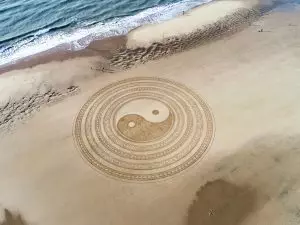
In TCM, we see ovulation as being a transition from Yin dominant energy to Yang dominant energy. The Yin energy has built up to the point when the egg is released, then Yang energy warms the uterus to prepare it for potential conception.
If there is stagnant Qi (life force energy) in the organ systems, this can cause the intense cramps some people experience during ovulation.
Acupuncture treatment, herbs, and the right nutrition can help move Qi and blood. The smooth flow of Liver Qi, in particular, is essential to not only enhance fertility, but to help ovulation and menstruation occur without blockages that cause pain.
Acupuncture and Chinese herbs have been shown to help relieve all types of gynecologically related pelvic pain, including endometriosis pain, menstrual pain, and period back pain.
Acupuncture treatment has a natural effect on the key hormones involved in follicle development, ovulation, and menstruation: estrogen, progesterone and prostaglandins. Balancing these hormones can help to regulate ovulation when it is not occurring, and also to help relieve cramps, tension, and other symptoms.
Top 3 Acupressure Points for Ovulation Pain
Here are some acupoints for ovulation cramps that you can use to help relieve pelvic pain.
- “Sea of Qi” CV6 – 1-2 inches below belly button, massage in a circular motion for at least a minute
- San Jiao Jiu CA6- 2 points that make a triangle with the navel, press firmly
- Zigong Ren Channel 3 – 4-5 inches below the belly button, press firmly for a minute
Acupuncture Near Me for Ovulation Pain
Whether you are experiencing monthly ovulation cramping, not sure when or if you are ovulating, or suspect that you may have PCOS, endometriosis, or fibroids, TCM and acupuncture offer a highly effective alternative treatment for gynecological issues. The doctors at Art of Wellness are highly respected experts when it comes to fertility treatment and women’s health. Their unique knowledge of Western gynecology and obstetrics combined with TCM allows them to work with you and your individual situation.
*This article is for education from the perspective of Traditional Chinese Medicine only. The education provided by this article is not approved by FDA to diagnose, prevent, treat and cure human diseases. It should not stop you from consulting with your physician for your medical conditions. Traditional Chinese Medicine is based on Qi, which is an invisible force that usually cannot be observed by modern science. Because science focuses on testing ideas about the natural world with evidence obtained through observation, these aspects of acupuncture can’t be studied by science. Therefore acupuncture and Chinese herbs are often not supported by double-blind, randomized trials, and they are considered alternative medicine therapies in the United States.
How to Treat Eczema With Acupuncture and TCM
By Qineng Tan, L.Ac., Ph.D. and Xiaomei Cai, L.Ac., Ph.D.

Itchy skin, dry skin? A bumpy skin rash that is raw from scratching it? Eczema, sometimes known as atopic eczema or atopic dermatitis, is a very common inflammatory skin condition. Acupuncture and TCM can help relieve itchy, scaly skin caused by eczema and skin allergy.
Eczema is a chronic inflammatory condition that flares up when triggered and becomes an allergic reaction rash. An eczema rash can look red and bumpy, or feel warm or hot to the touch. It can also show up as dry patches of skin that are rough and leathery, and can be brown or gray in color.
Scaly skin or eczema skin rashes that itch can appear anywhere on the body, but most commonly occur on the face, back of the neck, elbows, forearms, or backs of the knees.
Clusters of small, itchy fluid-filled blisters on the hands, fingers, or soles of the feet are known as dyshidrotic eczema, or dyshidrosis. This type of eczema can happen once, as an isolated incident, or become a chronic problem that keeps coming back.
What Causes Eczema?
Eczema is a widespread condition that often shows up in early childhood. About 80% of people who have atopic dermatitis show signs of skin rashes by the time they are six years old. It is estimated that about 1 in 10 people have some form of eczema.
The exact cause of eczema is not known, but it is generally believed to be a combination of factors, including: genetics, overactive immune function, and irritants in the environment.
Eczema is not contagious, but a person is more likely to experience allergic skin rash if allergies tend to run in their family. People who have hay fever, asthma, or are allergic to pet dander, pollen, or dust mites are more likely to have skin allergies like eczema, too, and possibly to pass these conditions on to their children.
Top 20 Eczema Triggers
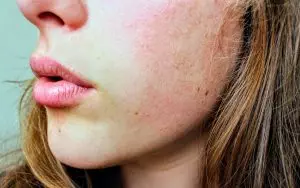
Eczema rashes tend to flare up when triggered by exposure to some allergen or element in the environment, or even a stressful situation. Common triggers for eczema breakouts include:
- Pet hair or dander
- Pollen
- Mold
- Dust or dust mites
- Insect bites
- Wool
- Synthetic fabrics like polyester or latex
- Metals, like copper, nickel, or gold
- Cigarette smoke
- Detergents or soaps
- Cleaning products
- Dyes
- Perfumes
- Chemicals in cosmetics or skin care products
- Frequent hand-washing
- Too-hot or too-frequent showers or baths
- Sweating
- Cold, dry places
- Humidity
- Emotional stress, work stress, or pressure at school
6 Types of Eczema
Eczema can present itself in different forms, with different types of skin conditions. The most common kinds of eczema include:
-
Atopic eczema or atopic dermatitis – dry, red, itchy, and/or bumpy skin
-
Contact eczema – caused by touching some irritant
-
Dyshidrotic eczema – marked by small, itchy blisters
-
Hand eczema– dry, peeling skin on the hands due to exposure to irritants or wetness
-
Neurodermatitis – thick, leathery, itchy patches of skin
-
Nummular eczema or discoid eczema – round lesions on the limbs or torso
The itchiness caused by eczema rashes is called pruritus, and it can be very intense, even disturbing a person’s sleep. Scratching the affected skin can damage it further, though, and lead to infections, so it is very important to find an effective treatment for the itching.
Eczema Cream and Eczema Treatment

Topical eczema cream is the most common treatment for atopic eczema. Topical corticosteroids are immunosuppressants in a cream form that help reduce inflammation and heal the itchy rash of an eczema flare up. However, when these topical steroid creams are used for long periods of time, they can make the skin thinner and more susceptible to bruising. Blood vessels may become more prominent (spider veins). Steroids inhibit the natural immune function of the skin, so a person may be more prone to skin infections.
Oral immunosuppressants like cyclosporine or systemic steroids may also be prescribed to treat eczema, but these, too, can only be used safely on a temporary basis, to help reduce the itchiness of a flare-up. Taking these medications for an extended period of time can have serious side effects, and they do not really address the root cause of eczema.
Acupuncture and TCM can be used as an alternative or adjunct eczema treatment, which can not only help relieve itching and help heal sores, but can help prevent flare-ups from returning.
Can Acupuncture Help Eczema?
The TCM theory of the Five Elements informs the way that we diagnose and treat each individual case of eczema. The root causes of eczema, or any skin rash, lie beneath the surface of the skin.
In TCM, Heat, Wind, Dryness, and Dampness are considered pathogenic forces that can take hold in the internal organs and then affect the way that skin cells develop. Examples of TCM diagnostic patterns of eczema or atopic dermatitis include:
- Brimming heat of heart and spleen
- Heart and spleen deficiency
- Spleen deficiency and dampness retention
- Wind and dryness due to blood deficiency
Each person’s experience with eczema is different because of the particular environmental or emotional triggers involved in the outbreak. By closely observing the color, temperature, and overall nature of the skin rash or scaly, thickened skin, the acupuncturist will get clues as to which internal systems are affected. By asking detailed questions about the patient’s lifestyle, the TCM practitioner is able to make recommendations that will help prevent further flare-ups.
Acupuncture treatment for eczema has been shown to help relieve itching better than antihistamines, and can also help to reduce skin inflammation.
Chinese herbal supplements designed to help relieve itchy skin have been shown to help relieve pruritus and reduce swelling. These studies suggest that herbs may be just as effective as topical steroids, but without the negative side effects.
The integration of Western medical methods and TCM treatment for eczema can be more beneficial than pharmacological treatment alone. Short-term use of topical corticosteroid eczema cream to help reduce inflammation and itching can be paired with acupuncture and herbs to help prevent flare-ups from recurring.
Acupuncture for Eczema Near Me in West Los Angeles
We want you to feel comfortable in your skin. At Art of Wellness, our comprehensive training in Western medicine, TCM, herbal medicine, and nutrition allows us to create a highly personalized treatment protocol for each patient. Many of our patients can attest that getting acupuncture and taking herbs have helped them reveal clearer, brighter skin and find relief from the pain of rashes and blemishes. If you or someone you love is suffering with itchy skin or allergic reactions, please consider trying TCM treatment for eczema and skin allergy.
*This article is for education from the perspective of Traditional Chinese Medicine only. The education provided by this article is not approved by FDA to diagnose, prevent, treat and cure human diseases. It should not stop you from consulting with your physician for your medical conditions. Traditional Chinese Medicine is based on Qi, which is an invisible force that usually cannot be observed by modern science. Because science focuses on testing ideas about the natural world with evidence obtained through observation, these aspects of acupuncture can’t be studied by science. Therefore acupuncture and Chinese herbs are often not supported by double-blind, randomized trials, and they are considered alternative medicine therapies in the United States.
How to Treat Dysmenorrhea With Acupuncture and TCM
By Xiaomei Cai, L.Ac., Ph.D. & Qineng Tan, L.Ac., Ph.D.
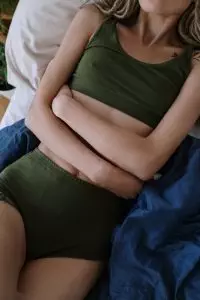
Menstrual cramps, unbearable period pain? Severe period cramps and period back pain are dysmenorrhea symptoms. Acupuncture and TCM offer a way to help with cramps and provide period cramp relief.
About 80% of women report having menstrual cramps and painful periods at some point in their lives. Over 40% of women regularly experience PMS cramps, or cramps before period. For some women, the pain is mild enough to tolerate. For others, severe period cramps are truly debilitating, leading to missed days of school or work.
Primary dysmenorrhea is when the period cramps are a result of prostaglandins (hormones) causing the uterus to contract forcefully to expel its lining. For some people, this action leads not only to pelvic pain, but can radiate to cause severe lower back pain, hip pain, or even pain in the legs.
Secondary dysmenorrhea is when severe menstrual cramps are related to another condition, such as endometriosis, uterine fibroids, or pelvic inflammatory disease (PID). About 1 in 10 women between the ages of 15-49 experiences endometriosis, which can cause excruciating pelvic pain during period, and negatively impact fertility. As many as 60-80% of women have fibroids, although many do not know it.
The severe period cramps may feel like a constant ache in the lower abdomen, or more like a gripping or throbbing pain that comes and goes.
Acupuncture and TCM offer an alternative way to treat period cramps and get period pain relief.
Top 5 Dysmenorrhea Symptoms
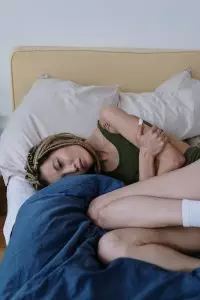
In addition to menstrual cramps and back pain during the period, some women experience other symptoms of dysmenorrhea, including:
Some women also experience vaginal cramps or ovary pain during period. This may be due to inflammation or scar tissue around the ovaries or ovarian cysts swelling.
How to Help Period Cramps
Generally, doctors will treat dysmenorrhea OTC pain medication, or NSAIDs like Ibuprofen, to relieve menstrual cramping due to primary dysmenorrhea. They may prescribe hormonal birth control, such as oral contraceptives (birth control pills), birth control patch, birth control implant, injection, or vaginal ring.
Hormonal birth control helps relieve period pain because it blocks ovulation and reduces the amount of prostaglandins being produced. However, this medication is not particularly helpful for those who may wish to get pregnant, or those who experience unpleasant side effects from birth control.
Possible Side Effects of Hormonal Birth Control
Many people may find that hormonal birth control causes side effects such as:
Potentially serious side effects may be more common the older a woman is, or the longer she remains on birth control; these could include: blood clots, gallbladder disease, heart disease, or even stroke.
If severe menstrual cramps are not relieved with pain medication, further investigation may be done to determine if there is some other condition causing pelvic pain.
Endometriosis is also usually treated with pain medications and contraceptives, or with Nupron, which suppresses the period. In severe cases, surgery may remove the patches of endometrial tissues. However, with both of these treatments, the endometriosis and severe period pain often come back.
Birth control, pain medications, and even surgeries may temporarily reduce painful cramps, but they are only masking the deeper problems. TCM and acupuncture can help get rid of menstrual cramps because they address the root cause of the pain.
Can Acupuncture Help Get Rid of Period Cramps?

In TCM, we look at organ systems as working together in harmony. Pain usually occurs because there is some imbalance in one or more of the major organ systems. Dysmenorrhea is usually considered to be related to Qi and/or blood stagnation, and often a deficiency of the kidney, liver, or both. In TCM, the liver controls the storage and distribution of blood, so it is central to the process of menstruation.
Dampness and cold are pathogenic forces that can be disruptive to the smooth flow of Qi related to menstruation. Being in a cold, damp place or eating too many cold or damp foods can cause blood stagnation in the abdominal area that leads to painful cramps.
Emotions can also play a significant role, as in TCM we see feelings of anger or depression causing liver stagnation. Deficiency of Qi can happen when a woman has gone through a lot, emotionally and physically, possibly through giving birth, or having stresses put on the reproductive organs.
Scientific research has shown that acupuncture has an effect on the production of key hormones like serotonin, estrogen and progesterone. When we use acupuncture points to balance the function of the liver, kidney, and other organ systems, these chemical changes occur naturally. We also use herbs to get vital nutrients into the blood that we can’t get from food.
Acupuncture is effective for treating conditions like endometriosis, uterine fibroids, ovarian cysts, and PCOS, as well.
Acupuncture treatment and herbal remedies for endometriosis and fibroids have been shown to reduce prostaglandin levels, which helps to relieve painful cramping and also to regulate cycles.
A study of endometriosis patients with dysmenorrhea who received electroacupuncture, the cure rate was 94.4% with low recurrence at the one-year checkup. Another study found that auricular acupuncture was effective 91% for mild to moderate menstrual pain.
TCM herbal formulations have been shown to be highly effective at relieving period pain. They work on the TCM principles of removing blood stasis to reduce swelling and relieve painful cramps.
When we are working to influence the menstrual cycle—in this case, to relieve painful cramping—it is usually best to have acupuncture treatment regularly for about three months. This way, we have time to balance the hormone fluctuations that occur during each phase of the cycle.
Top 3 Tips for Natural Relief from Period Cramps
Your acupuncturist can help give you personalized nutrition advice to help with your unique situation. Most people who are having trouble with painful periods can help themelves by trying these tips:
- Get more Omega-3 fatty acids in your diet – good natural sources include fish, flax seeds, and walnuts. You can also try taking fish oil, cod liver oil, or a vegan omega-3 supplement.
- Reduce consumption of ice-cold foods and beverages – icy drinks, ice cream, and raw foods can all cause a cooling of the uterus, which contributes to painful cramps.
- Avoid mucus-producing foods – foods that are more difficult to digest lead to mucus and stagnation in the organs. Reduce fatty foods, fried foods, and red meat.
Acupuncture Near Me for Dysmenorrhea in Los Angeles, Santa Monica
TCM has been used to treat menstrual difficulties and all types of gynecological issues for many centuries. The doctors at Art of Wellness in West L.A. bring special expertise in both TCM and western medicine gynecology and have partnered with the top women’s health and fertility specialists in Los Angeles. We have over 30 years of experience helping people regulate their menstrual cycles and experience more comfortable periods.
*This article is for education from the perspective of Traditional Chinese Medicine only. The education provided by this article is not approved by FDA to diagnose, prevent, treat and cure human diseases. It should not stop you from consulting with your physician for your medical conditions. Traditional Chinese Medicine is based on Qi, which is an invisible force that usually cannot be observed by modern science. Because science focuses on testing ideas about the natural world with evidence obtained through observation, these aspects of acupuncture can’t be studied by science. Therefore acupuncture and Chinese herbs are often not supported by double-blind, randomized trials, and they are considered alternative medicine therapies in the United States.
How to Treat Diverticulitis With Acupuncture and TCM
By Qineng Tan, L.Ac., Ph.D. and Xiaomei Cai, L.Ac., Ph.D.
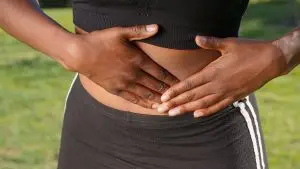
Pain in lower left abdomen? Stomach pain or pain in lower abdomen? Nausea, vomiting? Constipation or diarrhea? These may be diverticulitis symptoms. Acupuncture and TCM offer a way to help relieve diverticulitis pain and restore normal bowel function.
Diverticulosis refers to the presence of small sacs or pouches of tissue inside the large intestine, most often the colon (colonic diverticulitis), which are called “diverticula.”
Diverticulitis refers to the condition that occurs when the sacs become inflamed and infected. Diverticulitis causes pain and other symptoms like bloating and pain in left abdomen that might feel better after you pass gas or have a bowel movement.
Diverticular disease is becoming more and more common and is particularly widespread amongst older people, with at least half of all people over the age of 60 showing signs of diverticulosis.
While medical science has not definitively determined why people develop diverticulosis, it is believed to be due to eating a diet that is low in fiber and high in fatty foods like red meat.
Sedentary lifestyle (lack of exercise), being overweight or obese, smoking cigarettes, and regular use of anti-inflammatory medications or OTC pain medications (NSAIDs) may also be factors in the development of diverticulosis.
Many people have diverticulosis but are unaware of it because they don’t have any symptoms. It is only when the diverticula become infected and inflamed that diverticulitis treatment becomes necessary.
Acupuncture and TCM offer an alternative diverticulitis treatment that can help relieve pain and reduce inflammation in the colon.
Top 5 Diverticulitis Symptoms
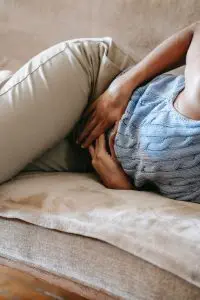
Diverticulitis symptoms are believed to occur because something like a bit of undigested food or stool becomes trapped inside one of the diverticula, and then bacteria start to grow, causing an infection.
While a person can have diverticulosis for a long time without any signs, symptoms of diverticulitis may come on suddenly and be quite severe.
The common signs of diverticulitis include:
- Abdominal pain or cramping, particularly pain in lower left abdomen—although in Asian countries, pain in lower right abdomen seems to be more prevalent. The pain may be constant, or it can come and go.
- Nausea and/or vomiting
- Fever and/or chills
- Constipation or diarrhea
- Rectal bleeding, bloody stool
Sometimes diverticulitis may cause a total lack of appetite and sudden weight loss, as a person just stops feeling like eating anything.
Diverticulitis can sometimes lead to more serious complications, like an abscess—which is when the infected area swells and fills with pus—or perforation of the bowel wall. These kinds of issues may require surgery.
Diverticulitis Treatment
Some other gastrointestinal disorders can present with symptoms that are similar to those of diverticulitis, such as: colitis or inflammatory bowel disease, IBS (irritable bowel syndrome), or bowel obstruction. Gynecological problems like endometriosis, an ovarian cyst, or an ectopic pregnancy could also cause severe pain in the lower left abdomen. A UTI could also cause acute abdominal pain.
Diagnosis of diverticulitis will usually begin with a doctor feeling the abdomen for signs of tenderness, then they will order tests (blood tests, urine tests, and/or stool tests) to check for infection. Once other problems have been ruled out, a CT scan may show the diverticula (infected sacs/pouches in the large intestine).
There is some debate about when to perform a colonoscopy in cases of diverticulitis, as the procedure can cause perforations of the intestinal lining to become worse. Usually, a colonoscopy is recommended several weeks after a person has recovered from an acute attack of diverticulitis.
Because diverticulitis is usually caused by an infection, the most common medical treatment is a course of antibiotics, along with rest and pain relievers, until the acute symptoms have abated. A liquid diet may be indicated until the situation improves, with the gradual reintroduction of solid foods.
Recommendations will usually include that a person quits smoking (if they smoke) and makes changes in their diet: especially eating less meat and fatty foods and increasing fiber intake. It used to be common for doctors to tell their patients not to eat foods like popcorn, seeds, or nuts, under the assumption that small, hard kernels might become trapped in the diverticula and cause irritation. However, more research has shown that eating these types of foods does not seem to cause flare-ups of diverticulitis.
If these treatments do not help to relieve diverticulitis pain, or if a complication like an abscess or perforation in the colon wall develops, surgery may be necessary. The most common surgery for diverticulitis is a colon resection, which involves removing the part(s) of the large intestine that have been damaged. Sometimes it is not possible to repair the colon completely, and in these cases, a person may have to have a colostomy.
Acupuncture and TCM offer an alternative or adjunct treatment for diverticulitis that can help reduce inflammation in the bowel and relieve abdominal pain.
Can Acupuncture Help Diverticulitis?

An acupuncturist will make a TCM diagnosis based on where and what kind of abdominal pain and other diverticulitis symptoms a patient is experiencing. According to TCM theory, pain and problems with the digestive organs can be related both to stagnant Qi (life energy) or blood in that area, and the presence of a pathogenic force like dampness, heat, or cold.
The quality of diverticulitis pain and how it changes when you eat or move your bowels will provide clues as to what the root cause is.
In TCM, the spleen is considered to be responsible for turning nutrients into energy; when it is not functioning well, a person may have diarrhea. Strengthening the spleen is usually an important part of TCM treatment for diverticulitis and other digestive disorders.
Your acupuncture practitioner can help relieve symptoms like nausea, constipation, diarrhea, bloating, and stomach pain, while also helping to heal and strengthen the lining of the intestines and reducing inflammation. Boosting immune function will help prevent further infections.
It is generally necessary for a person with diverticulosis to make changes in their dietary habits. While increasing intake of fiber and fluids is important, there are probably even more specific foods that are triggering the dysfunction of the gastrointestinal system, creating excess heat or dampness in the internal organs. TCM nutrition views all foods as having properties that either cool or warm the body. So, your acupuncturist will be able to advise you on what food program will work best to balance your health.
In general, nourishing broths, soups, and well-cooked vegetables with lean proteins and whole grains with plenty of fiber are the best diet for people with diverticulitis. Avoid cold, raw foods, fatty foods, red meat, and dairy.
Acupuncture Near Me for Diverticulitis In West Los Angeles
Acupuncture and TCM provide an effective way to treat abdominal pain and gastrointestinal disorders of all kinds. At Art of Wellness, we have over 35 years of experience helping people find pain relief and improve their digestive health.
*This article is for education from the perspective of Traditional Chinese Medicine only. The education provided by this article is not approved by FDA to diagnose, prevent, treat and cure human diseases. It should not stop you from consulting with your physician for your medical conditions. Traditional Chinese Medicine is based on Qi, which is an invisible force that usually cannot be observed by modern science. Because science focuses on testing ideas about the natural world with evidence obtained through observation, these aspects of acupuncture can’t be studied by science. Therefore acupuncture and Chinese herbs are often not supported by double-blind, randomized trials, and they are considered alternative medicine therapies in the United States.